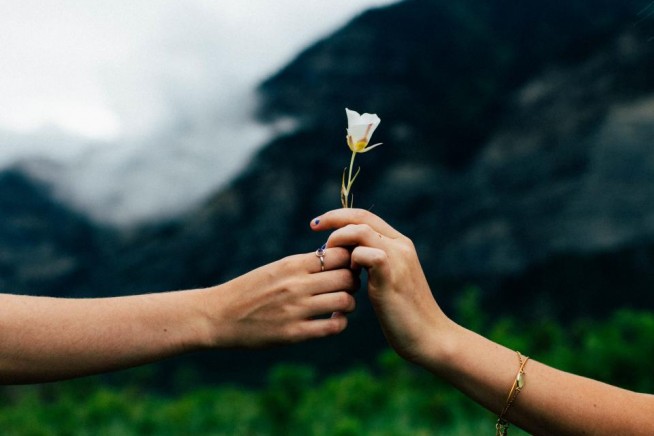Until very recently, I was in denial…
I believed that positivity consisted on only focusing on “positive” things and ignoring everything “negative.”
So that’s how I lived my life. I dodged my shadows and avoided my own darkness, then wondered why I felt confined and limited. In doing this, even though I thought that my life was all sunshine and rainbows (because that was the only territory I let myself explore), I was governed by the fear of fear itself (which is a self-created illusion). This phase lasted two-three years, until the Seeker archetype within me grew to the point where curiosity, backed by a deep sense of courage/faith/trust, could no longer be confined by fear.
Positivity can be immensely useful, but when it becomes your identity or a way of avoiding the uncomfortable, you ironically slip into a life governed by fear and delusion.
This is the trap of what I call delusional positivity; disregarding anything negative and pretending that it doesn’t exist. This is a dangerous way to live because what is suppressed will inevitably manifest in other ways. Although this naïve optimism seems all loving and pleasant, it’s based in fear; the fear of your own darkness (as well as the external reflection of it in the world).
And what is positive anyway? Essentially, positive and negative are just labels which we place upon things that the ego either likes (positive) or dislikes (negative). When you draw your perspective back and look at the big picture, what you might deem positive and negative will often flip flop. For example, being hospitalized for alcohol poisoning when I was nineteen seemed like a “negative” experience at the time, yet it was the greatest catalyst for my journey of self-discovery.
“There is nothing either good or bad, but thinking makes it so.” – William Shakespeare
This concept is hard to swallow from the limited perspective of the ego, especially with the extremes of war and suffering going on this planet. But we cannot truly understand love and freedom until we experience the extreme opposite. I’m not in any way saying to enable these atrocities though. Part of our process is to overcome them collectively (which begins within each individual). However, the woes of the world serve the purpose of being a harsh reference point of what we don’t want and the ultimate difficult learning experience.
“If there is a meaning in life at all, then there must be a meaning in suffering. Suffering is an ineradicable part of life, even as fate and death. Without suffering and death, human life cannot be complete.” – Viktor Frankl
Contrast is necessary for holistic understanding.
We need negativity to appreciate positivity. @SteviePThatsMe (Click to Tweet!)
We need darkness to appreciate light. From a higher perspective, challenges are viewed as an opportunity to grow, hurdles are viewed as opportunities to leap and pain is viewed as a means of truly understanding joy.
Love is the innermost craving of humans. Why? Because it is our essence. We experience fear, pain, suffering and the like because through experiencing contrast, we’re able to truly understand and appreciate love.
Love is a unifying force, while fear is divisive. This applies both internally and externally. Fear divides people and fear divides aspects of yourself. And whenever things are divided, they come into conflict with one another. But love unifies and creates wholeness. So it’s only common sense that the totality of everything is love. Love is the fabric of Oneness. Love is the defining element of Source.
Big Picture Positivity (Positivity 2.0)
This is a call to let go of short-sighted, delusional positivity and courageously embrace Big Picture Positivity.
Big picture positivity is the ability to love everything. It is being able to acknowledge and show compassion towards both polarities of duality (light and dark, good and evil, bad and good, negative and positive…etc.).
Big picture positivity is the application of unconditional love. Big picture positivity is unwavering compassion. Big picture positivity is a total acceptance of what is, without judgment or resistance.
Can you acknowledge your inner demons and meet them with a compassionate hug? If not, then you’re governed by fear.
Can you acknowledge “negative” emotions without trying to avoid or change them? If not, then you’re creating resistance, self-judgment and denial.
Can you acknowledge your darkness and shine light on it? Or are you too afraid? If you’re afraid of something within you, then you’re fragmented yourself. This self-fragmentation will subtly pull on you, pleading to be acknowledged, and will fester until it becomes something that you’re forced to deal with (like a disease).
Can you acknowledge the evil of the world and meet it with empathy, compassion and love? Or do you react with fear, anger or judgment?
Crime and the criminal justice system is actually a macrocosm of the practice of big picture positivity, or meeting everything with love. Ignoring crime obviously doesn’t work. But judging and punishing crime isn’t the best solution either (look at the massive failure/disharmony of the US criminal justice system). What does work, however, is acknowledging crime and healing the individual who committed the crime. It is addressing an aspect of the whole that is crying out for help and meeting it with love. People who feel love do not harm themselves or others; it’s as simple as that. So wouldn’t love be the obvious solution?
The same principle applies to shadow aspects of ourselves. Acknowledge your shadows and meet them with compassion. Heal with unyielding love.
There’s nothing to be afraid of. It all just is. All of that fear simply comes from resistance to what is.
Love it all.
– Stephen Parato

Stephen Parato (aka Stevie P) is your friendly, neighborhood Earth traveler, intuitive coach, Reiki master, Siddha healer, kinesiologist, philosopher, writer, poet, positivity connoisseur and Pokemon master. Stevie P’s internet home base is his blog Feelin’ Good, Feelin’ Great. You can also find him on Twitter, Facebook, YouTube & Instagram.
Image courtesy of Evan Kirby.












